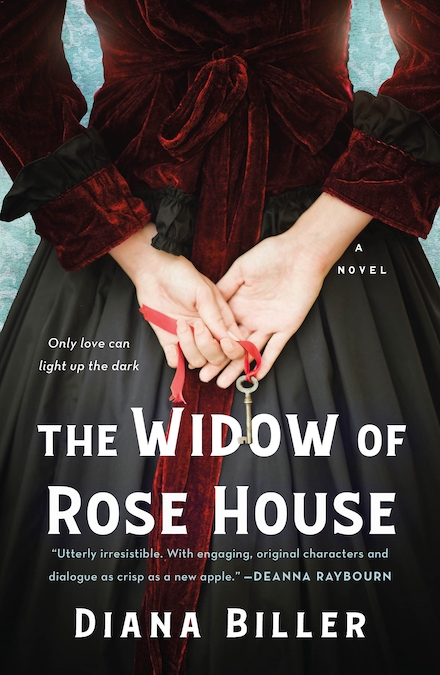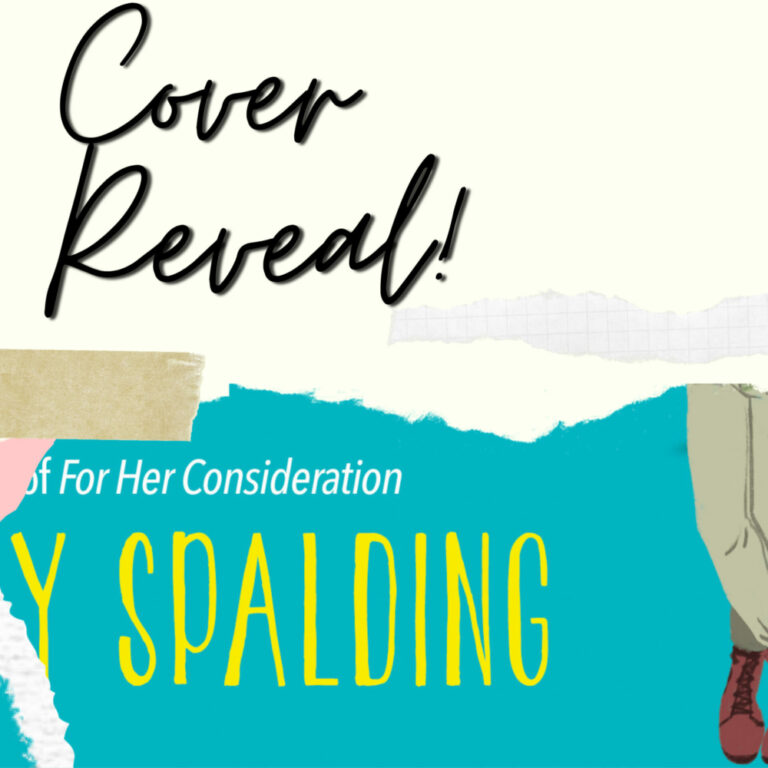We are excited to bring you this lauded début book by Diana Biller.
About The Widow of Rose House:
Prior to penning this novel with a decidedly dark Victorian Gothic flair, Diana Biller had one idea in mind: “Edith Wharton, ghost hunter.” After touring Wharton’s estate, The Mount, and the Vanderbilt Mansion in Hyde Park, New York, she came away with a wealth of inspiration and The Widow of Rose House was born.
It’s 1875 and New York’s Gilded Age is in full swing. After fleeing her abusive husband, Alva Webster spent three years being pilloried in the newspapers of two continents. Now he’s dead, and she’s returned to New York to start over, restore Liefdehuis, a dilapidated Hyde Park mansion, for her new home decoration book and hopefully repair her reputation in the process.
So when the eccentric and brilliant Professor Samuel Moore appears, threatening her fresh start with stories of a haunting at her house, she refuses to give him access. Alva doesn’t believe in ghosts. A pioneer in electric lighting and a member of the nationally-adored Moore family of scientists, Sam’s latest obsession is ghosts. When he learns about a house with a surprising number of ghost stories, he’s desperate to convince its beautiful owner to let him study it. Can he find his way into her house…and her heart?
Frolic-Exclusive Excerpt
New York City, February 17, 1875
Sam took one look at the tidy brownstone, with its immaculate steps and delicate lace curtains, and retreated to the bottom of the stairs to scrape his boots more carefully. The mud clung, so he shrugged and sat down on the first step to unlace them.
His thoughts wandered to his most recent fascination: the scandalous Mrs. Webster. She hadn’t seemed particularly scandalous when he’d met her — she’d seemed smart, and strong, and…wary. He’d discovered why the next morning when he’d started into the newspaper archives at the Astor Library. He’d meant to focus on her house, but his curiosity about the woman had overwhelmed him, and it wasn’t as though she was hard to find.
Two years ago, with no instigating incident Sam could find, Alva Webster had jumped from the society column of the Parisian papers (“Mr. and Mrs. Webster hosted several American friends at a select dinner party…”) to the pages of scandal sheets across Europe. Her name was dragged from salacious headline to salacious headline; thinly sourced stories about extravagant orgies and titillating affairs. Ten months later, her husband, whom she had not been living with at the time, had been murdered by ruffians in Monte Carlo. This poured oil onto an already roaring fire, and Mrs. Webster was promoted again, from scandal sheets to front page news. The papers had even breathlessly reported when she’d begun wearing lavender three months after the murder, a sartorial decision which was apparently very shocking for reasons Sam didn’t quite grasp.
He got one boot unlaced and frowned down at it. Did it always take that long to unlace a shoe? He removed his watch and set it on the step next to him before he began the next one.
The stories were awful and almost certainly libelous. They would have flattened a weaker person. That Alva Webster still stood, with her back ramrod straight and her jaw set firmly against the world only intrigued him more.
He’d researched the Rensselaers, the wealthy banking family she came from, and discovered her father was a member of one of the consortiums that had recently approached him about the same municipal lighting project the Dentons were interested in. Curiously, there was hardly any mention of them in the newspaper stories, a fact that nagged at him. He wondered how they’d been able to restrain themselves during the worst of it. He wouldn’t have been able to, if it had been a member of his family. Once he’d been able to tear himself away from the woman, he’d begun gathering data about the house. The project had occupied every spare moment of the last three weeks — well, perhaps not every spare moment; there was the prototype of the carbon lantern that had popped into his head that night, which he’d quickly knocked together, as well as the three iterations that had come after — but otherwise he’d been devoted to the Webster project.
He’d started in the libraries and government offices, simply gathering as much data as he could on the former occupants of the house, who had been born there, who had worked there, who had died there. This was surprisingly difficult information to obtain: property records, tax records, and census reports accounted for some years and some classes, but in between census years it was very difficult find out who the servants had been, let alone what their lives there had been like. He’d come across the woman he was about to visit, one Magda Kay, in the 1840 census listed as a scullery maid.
The second boot came off, and he looked down at his watch. Twenty three seconds! That was forty six seconds per pair of boots. Assuming it would take approximately the same amount of time to lace them up — an assumption he only barely restrained himself from testing right then — and only one cycle per day, which was conservative, since there were plenty of days in which you’d need to take your shoes off in the middle of the day for some reason, that amounted to over four and a half hours a year. Sam blinked down at the offending boots and took out his note book. Perhaps a device that did the lacing and unlacing for you…or perhaps it would be better to simply redesign the shoe itself. . . .
“Professor Moore?” the voice came from above him, a little hesitant.
“Hmm?”
“Begging your pardon, sir, but Mrs. Kay wondered whether you might like to come inside, it being so cold out here.”
Was it cold? Sam wiggled his sockclad toes and realized they were slightly numb. “All right,” he said, pushing his muddy boots neatly to the side before standing.
The voice belonged to a young maid, her arms crossed over her chest as if to trap her remaining warmth. Realizing he was the reason she was standing out in the cold, he quickly ducked through the open door, smiling apologetically at her as he went. Her cheeks went a little pink, and she let out a small sigh, no doubt pleased to be back inside.
She led him to a room right off the narrow hall they’d entered, a sitting room so tidy it looked as though it were only barely tolerating human occupancy. A plump woman in her early fifties stood as he entered, smiling at him cheerfully.
“Professor Moore,” she said, her brown eyes sparkling up at him. “What an honor. I’ll be the queen of the neighborhood for the next six months.”
He grinned at her. “Mrs. Kay, if you’re not already the queen of your neighborhood, I’ll profess myself shocked.”
“Hah! A flirt, too. Sit, sit.” She waved him into a chair by the fire and turned to her maid. “Alice, we’ll have tea, the cookies as well.”
There was a bustle while refreshments were wheeled in, and Mrs. Kay made herself busy pouring tea while Sam enjoyed the crackle of the fire and four excellent butter cookies.
“Now,” she said, handing him a cup of tea and settling her self into her chair. “I’ll admit I was surprised to receive your letter. I haven’t thought about Liefdehuis…oh, in years, probably. It seems on the other side of the world from me, now.”
“You worked there in ’40, right?”
“Thirtyfive years ago,” Mrs. Kay sighed. “From 1838 to 1840, that’s right. I was sixteen when I started and eighteen when I went to visit my sister in the city and met Mr. Kay; just a dock worker then, he was, but he did well for himself later. He was a fine looking young man, you understand, and my head was fairly turned, but in hindsight, never having to go back to that house was a powerful incentive for marriage, too.”
Sam wrote as she spoke. “That bad?”
“Mr. de Boer, that’s the younger one, his father having passed a couple years before I started, he was one of those types that has to be making someone else feel bad before he can feel good. I read he committed suicide, a few years after the crash, and though I can’t say I shed any tears, it made me wonder how bad it must have been for him, that he needed everyone around him to feel worse.” She sighed and shook her head, as if to dismiss such dark thoughts. “Is he who you’re researching? I admit I don’t quite see what interest a famous inventor could have in the de Boers.”
He hesitated, wondering how to lead into his subject. Henry would have finessed the conversation so it just sort of flowed in the right way, but Henry was boycotting this project. Maybe if he sidled up to it, delicate like…“Actually, I’m researching the ghost,” he said.
“The ghost!” Mrs. Kay set her teacup down in its saucer with a decided clink. “I don’t think you’ll be finding any world changing inventions there, young man.”
He laughed, too used to skepticism to mind her reaction. “I’m not looking for any,” he said. “Just interested in the story. Call it a hobby.”
“Hmm.” She looked over at him, her lips pursed but her eyes still merry. “Well, which story?”
“You heard more than one?”
“It was quite a topic of discussion in the servants’ hall, your ghost. A few of the maids swore up and down they’d seen it, that they knew the whole sad tale.” Mrs. Kay snorted. “Not that they could ever agree on what they’d seen, of course, and it was my suspicion half the stories were made up, for attention.”
“Only half?” Sam looked up from his notebook. “You mean you believed some of them?”
“Not exactly believed,” she said. “Well, I couldn’t believe in them, when the stories didn’t even agree with each other, but let’s say there were a couple of maids whose hysterics seemed less theater and more fear. I don’t know if they hoaxed themselves into seeing something, or if someone was tormenting them on purpose. For all I know there were two ghosts wandering the halls instead of one.”
Ghost infestation? Sam wrote on the page, briefly imagining ghostly rats fleeing before a ghostly terrier.
“Do you remember the stories? The ones you found more credible?”
“Oh yes,” she said, beaming with the joy of a true gossip and storyteller. “They were both quite sad, of course. The first one was about a beggar, a village man who’d lost his family the year before, going door to door in the winter asking for food. Only the winter was uncommonly cold, and one night he crept up to the back door at Liefdehuis and asked to come in, just for a minute, to warm himself. But the servants were under strict orders about tramps, so they closed the door in his face and went up to their beds. When they came down the next morning, they found him where they’d left him, curled up on the back porch and frozen to death.”
“You’re sure it was a man?” He’d heard stories like that before, but they were almost always about older women.
Mrs. Kay tilted her head, thinking. “As sure as I can be after almost four decades,” she said, nodding, and then chuckled. “Which is to say, more sure than not, but by no means without doubts.”
Sam smiled back at her. “And the other?”
“Well,” she said, and looked over her shoulder at the door. Putting her finger to her lips, she rose and crept stealthily across the room. When she reached the sitting room door she paused, pressing her ear against the wood, and then in one sudden gesture yanked it open, nearly toppling the young maid on the other side.
“Alice,” Mrs. Kay said, “won’t you go fetch Professor Moore some of those lemon cookies Cook made yesterday? He’ll like them.”
“Yyyes’m,” Alice stammered, her face bright red, and almost ran from the room.
Mrs. Kay gave a satisfied nod and sat down. “It’s not a story for maiden ears,” she explained, pouring herself a second cup of tea. “But it’s a familiar one, for all that. The tale goes that the ghost was a young servant girl who was seduced by the son of the house. She found herself . . . in a certain situation, you know, and went to him to tell him she was, and he looked her in the face and told her that he’d never been with her and if she was in such a situation it must be by one of the countless other men she’d slept with. She drowned herself in the pond the very next night.”
Mrs. Kay added two cubes of sugar, stirring them in with a thoughtful air. “Maybe I should have let Alice hear it, after all. She won’t always live in a house like this one.”
Buy Links:

About the Author:
She lives in Los Angeles with her husband and their very good dog. The Widow of Rose House is her début novel.
Where to Find Diana:
Website: http://www.dianabiller.com
Twitter: http://www.twitter.com/dcbiller
Instagram: http://www.instagram.com/dcbiller












